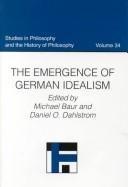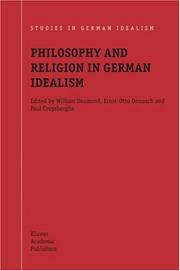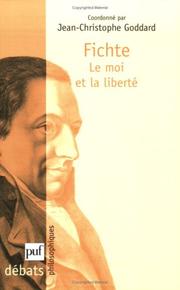| Listing 1 - 10 of 27 | << page >> |
Sort by
|
Book
ISSN: 04405927 ISBN: 9783787322633 9783787322640 3787322647 Year: 2012 Volume: 57 Publisher: Hamburg: Meiner,
Abstract | Keywords | Export | Availability | Bookmark
 Loading...
Loading...Choose an application
- Reference Manager
- EndNote
- RefWorks (Direct export to RefWorks)
"Das durch Kant herbeigeführte Ende der Metaphysik wirkt wie ein Schibboleth, das die ihm nachfolgenden Denker in Freund oder Feind einer nachkritischen Philosophie teilt. So steht auch Hegels Bemühen um eine nachkritische Metaphysik im Verdacht, hinter Kants Kritik zurückzufallen. Der vorliegende Band sucht das die Klassische Deutsche Philosophie durchziehende Spannungsverhältniz von Metaphysik und Metaphysikkritik exemplarisch an den Texten von Kant, Jacobi, Fichte, Hölderlin, Hegel und Schelling aufzuzeigen und die Möglichkeiten der Aufhebung dieses Spannungsverhältnisses - im Hegelschen Sinne - auszuloten."--P. [4] of cover.
Metaphysics --- Idealism, German --- Philosophy, German --- German philosophy --- German idealism
Book
ISBN: 3506765329 Year: 1986 Publisher: Paderborn Schöningh
Abstract | Keywords | Export | Availability | Bookmark
 Loading...
Loading...Choose an application
- Reference Manager
- EndNote
- RefWorks (Direct export to RefWorks)
Idealism, German --- Nationalism --- German idealism --- History --- History of Germany and Austria --- anno 1800-1999

ISBN: 0813209285 9780813209289 Year: 1999 Publisher: Washington: Catholic university of America press,
Abstract | Keywords | Export | Availability | Bookmark
 Loading...
Loading...Choose an application
- Reference Manager
- EndNote
- RefWorks (Direct export to RefWorks)
Immanuel Kant's "critical philosophy" is rightly renowned for its criticism of the metaphysical pretensions of reason unaided by experience. It therefore seems ironic that, within a single generation, some of Kant's most important followers argued that the critical philosophy could be made fully critical only by recourse to the very metaphysical themes that Kant had apparently criticized. The story of the emergence of German Idealism (from its beginnings in Kant to its apparent consummation in Hegel) has never been fully told. The story is full of tensions, contradictions, and reversals, all of which seemingly conspire to render a meaningful and unified account impossible. While defying any simple or simplistic explanation, the various and sometimes conflicting impulses that led to the emergence of German Idealism together constitute an intelligible and rich line of development. In this volume, an international group of leading scholars shows how the various aspirations at work in the emergence of German Idealism-moral, religious, aesthetic, political, and epistemological-can be understood as both consummating and overcoming Kant's critical philosophy. The volume also includes a chronology of the major works in the development of German Idealism, as well as a new translation of the seminal and still-controversial essay, "The Earliest System Programme of German Idealism." The contributors are: Karl Ameriks, Hans-Michael Baumgartner, Michael Baur, Daniel Breazeale, Daniel O. Dahlstrom, Martin de Nys, Klaus Dsing, Karsten Harries, John McCumber, Kenneth L. Schmitz, Alexander von Schnborn, Xavier Tilliette, and Merold Westphal.
Idealism, German --- German idealism --- History of philosophy --- anno 1700-1799 --- anno 1800-1899 --- Germany
Book
ISBN: 3826011392 Year: 1996 Publisher: Würzburg Königshausen & Neumann
Abstract | Keywords | Export | Availability | Bookmark
 Loading...
Loading...Choose an application
- Reference Manager
- EndNote
- RefWorks (Direct export to RefWorks)
Idealism, German --- Metaphysics --- Philosophy, German --- German idealism --- History --- History of philosophy

ISBN: 1402023243 9786610190492 1280190493 1402023251 9781402023248 Year: 2004 Volume: 3 Publisher: Dordrecht: Kluwer Academic Publishers,
Abstract | Keywords | Export | Availability | Bookmark
 Loading...
Loading...Choose an application
- Reference Manager
- EndNote
- RefWorks (Direct export to RefWorks)
Idealism, German --- Philosophy, German --- Academic collection --- German idealism --- History of philosophy --- Religious studies --- anno 1800-1899 --- anno 1700-1799 --- Germany --- Philosophy, German - 18th century --- Philosophy, German - 19th century
Book
ISBN: 377052411X Year: 1987 Volume: 1432 Publisher: München Fink
Abstract | Keywords | Export | Availability | Bookmark
 Loading...
Loading...Choose an application
- Reference Manager
- EndNote
- RefWorks (Direct export to RefWorks)
Stirner, Max --- Marx, Karl --- Nietzsche, Friedrich W. --- Kierkegaard, Søren --- Schelling, von, Friedrich W.J. --- Schleiermacher, Friedrich Daniel Ernst --- Schopenhauer, Arthur --- Engels, Frederick --- Dilthey, Wilhelm --- Germany --- Philosophy, German --- Idealism, German --- Philosophie allemande --- Idéalisme allemand --- -Idealism, German --- -German idealism --- German philosophy --- History --- -Philosophy, German --- -History --- -Stirner, Max --- Nietzsche, Friedrich --- Idéalisme allemand --- German idealism
Book
ISBN: 2801700762 9782801700761 Year: 1978 Volume: 27 Publisher: Louvain: Peeters,
Abstract | Keywords | Export | Availability | Bookmark
 Loading...
Loading...Choose an application
- Reference Manager
- EndNote
- RefWorks (Direct export to RefWorks)
Metaphysics --- Duits idealisme --- German idealism --- Idealism [German ] --- Idealisme [Duits ] --- Idéalisme absolu --- Idéalisme allemand --- Idéalisme objectif --- Idéalisme subjectif --- Transcendantal [Le ] --- Transcendentale [Het ] --- Transcendentalism --- Idealism --- Idéalisme --- Transcendantalisme --- Academic collection --- Philosophy --- Philosophy, Modern --- Animism --- Monism --- Personalism --- Positivism --- Dualism --- Materialism --- Realism --- Idéalisme
Book
ISBN: 3476021181 3476052117 9783476021182 Year: 2005 Publisher: Stuttgart: J. B. Metzler,
Abstract | Keywords | Export | Availability | Bookmark
 Loading...
Loading...Choose an application
- Reference Manager
- EndNote
- RefWorks (Direct export to RefWorks)
Der Deutsche Idealismus war und ist eine der wichtigsten Ideenkonstellationen in der Geschichte der neueren Philosophie. Das Handbuch führt systematisch in die Fragestellungen des Deutschen Idealismus ein: Die Vernunft und das Absolute, System und Methode, Erkenntnis und Wissen, Natur, Moral, Recht und Staat, Geschichte, Religion und Kunst. Einbezogen wurde die Philosophie der Frühromantik und das Werk Hölderlins. Erstmals wird auch die Geschichte der Rezeptionen des Deutschen Idealismus in Europa dargestellt.
Idéalisme allemand --- History of philosophy --- anno 1800-1899 --- anno 1700-1799 --- Germany --- Idealism, German --- Philosophy --- Philosophy, German --- Philosophie allemande --- History --- Histoire --- German idealism --- Idealism, German - Handbooks, manuals, etc.
Book
ISBN: 9781107404335 9780521509640 9780511770432 9780511769603 0511769601 9780511766534 051176653X 0521509645 1107189543 0511847815 1107404339 1282651471 9786612651472 0511768761 0511765142 0511767927 051177043X Year: 2009 Publisher: Cambridge, UK ; New York : Cambridge University Press,
Abstract | Keywords | Export | Availability | Bookmark
 Loading...
Loading...Choose an application
- Reference Manager
- EndNote
- RefWorks (Direct export to RefWorks)
The philosophy of Hans-Georg Gadamer interests a wide audience that spans the traditional distinction between European (continental) and Anglo-American (analytic) philosophy. Yet one of the most important and complex aspects of his work - his engagement with German Idealism - has received comparatively little attention. In this book, Kristin Gjesdal uses a close analysis and critical investigation of Gadamer's Truth and Method (1960) to show that his engagement with Kant, Hegel, and Schleiermacher is integral to his conception of hermeneutics. She argues that a failure to engage with this aspect of Gadamer's philosophy leads to a misunderstanding of the most pressing problem of post-Heideggerian hermeneutics: the tension between the commitment to the self-criticism of reason, on the one hand, and the turn towards the meaning-constituting authority of tradition, on the other. Her study provides an illuminating assessment of both the merits and the limitations of Gadamer's thought.
Gadamer, Hans-Georg --- Aesthetics --- Hermeneutics --- Idealism, German --- German idealism --- Interpretation, Methodology of --- Criticism --- Beautiful, The --- Beauty --- Esthetics --- Taste (Aesthetics) --- Philosophy --- Art --- Literature --- Proportion --- Symmetry --- Psychology --- Gadamer, Hans-Georg, --- Idealism, German. --- Hermeneutics. --- Aesthetics. --- Arts and Humanities --- Radio broadcasting Aesthetics

ISBN: 2130510531 9782130510536 Year: 2000 Volume: *6 Publisher: Paris: PUF,
Abstract | Keywords | Export | Availability | Bookmark
 Loading...
Loading...Choose an application
- Reference Manager
- EndNote
- RefWorks (Direct export to RefWorks)
La philosophie de Fichte est une philosophie du moi. Est-ce à dire qu'il faut y voir une philosophie de La subjectivité finie, achevant en système l'idéalisme kantien ? Ou bien faut-il s'inquiéter de ce que le moi y soit aussi dit " absolu ", et chercher chez Fichte Les prémices des philosophies schettingienne et hégélienne de l'absolu ? Le but de ce volume est de convaincre que la philosophie de Fichte est plutôt une pensée originale de la construction duale, contradictoire, du moi humain en lequel sont à la fois opposées et réunies finitude et absoluité. Or le médium de cette synthèse vivante du fini et de l'absolu dans le moi humain, c'est la liberté comme libre choix d'elle-même. De sorte que, confondant volonté d'être soi et volonté d'être libre, la philosophie de Fichte est, comme philosophie du moi, philosophie de la liberté. Philosophie de la liberté, elle reste au double sens d'une pensée de l'autodétermination pratique du sujet fini et d'une pensée de l'absolu comme agir pur. C'est pourquoi l'intention de ce volume est de mettre en relief la valeur émancipatrice de la philosophie de Fichte tant sur le plan de l'action que celui de la spéculation.
Philosophical anthropology --- Fichte, Johann Gottlieb --- Cogito --- Duits idealisme --- German idealism --- Idealism [German ] --- Idealisme [Duits ] --- Idéalisme absolu --- Idéalisme allemand --- Idéalisme objectif --- Idéalisme subjectif --- Ik (Filosofie) --- Moi (Philosophie) --- Self (Philosophy) --- Philosophy, Modern --- Liberty --- Philosophie --- Liberté --- History --- Histoire --- Fichte, Johann Gottlieb, --- Liberté --- Fichte, Johann Gottlieb, - 1762-1814
| Listing 1 - 10 of 27 | << page >> |
Sort by
|

 Search
Search Feedback
Feedback About UniCat
About UniCat  Help
Help News
News